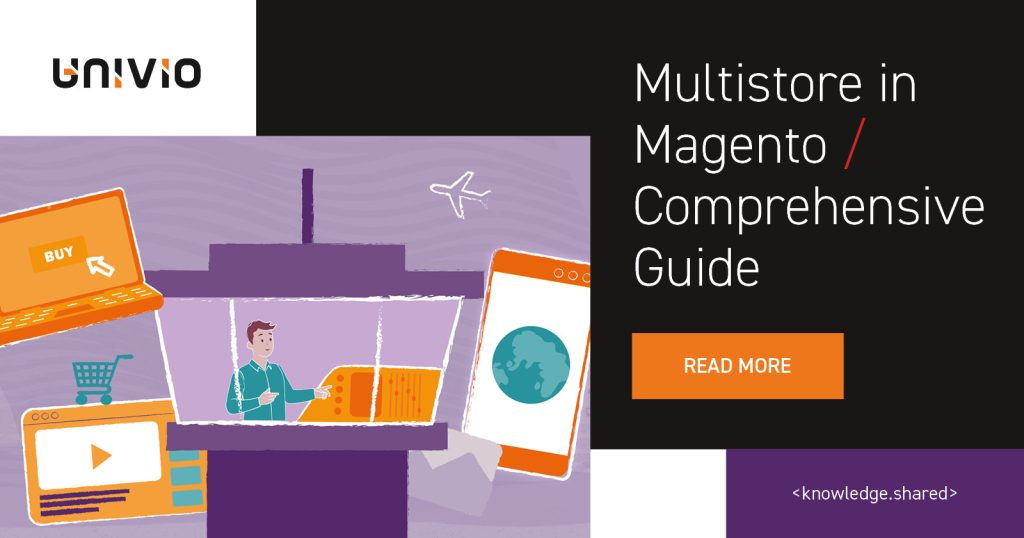Cross-border e-commerce with Magento – start selling on new markets
The rapid growth of e-commerce provides companies with a unique opportunity to expand into international markets. Cross-border e-commerce is becoming one of the most effective ways to reach new, often more wealthy customers and increase margins.
Selling in multiple markets poses numerous challenges for stores, such as localizing their offerings, adapting to different currencies, regulations and consumer preferences in different countries. As an advanced e-commerce platform, Magento supports businesses in dealing with these challenges, enabling effective international sales.
The growing popularity of cross-border e-commerce in Poland
The report “Cross-border e-Commerce. A Brand Without Borders” shows that more and more Polish companies see the benefits of expanding abroad. As many as 60% of them are already selling internationally, and another 20% plan to enter new markets in the next three years. What’s more, one in five companies that decided to sell across borders saw a 20% increase in revenue. These figures show that properly conducted business in foreign markets brings significant benefits.
Key Magento functionalities to support cross-border sales
Magento is equipped with a set of tools that help develop sales in multiple markets simultaneously. The flexibility of this platform makes it easy to customize e-commerce sites to meet local customer needs, influencing the success of international sales.
Offer localization for different markets
Entering new markets requires adapting your offerings to local realities. Magento allows you to create separate versions of your store (called Store Views) for different countries or regions, allowing you to personalize content, currencies and languages. For example, a Polish clothing company planning to sell in Germany and France is creating dedicated store versions for those markets. German customers are already offered winter collections, while French customers are still offered summer sales, with each version of the store taking into account local prices, promotions and currencies – and this helps build customer trust.
Currency handling also plays a key role. Magento automatically converts prices in local currencies using services such as Fixer.io, which allows you to present current prices according to current exchange rates, minimizing the risk of confusion and discouraging customers.

Content translations tailored to the audience
When dealing with international trade, the content in your store must be adapted to the language and culture of your customers. Magento offers advanced tools for managing translations – not only of product descriptions, but also of terms and conditions or privacy policies. For example, a company selling electronics in Poland and Spain can quickly translate changing product descriptions using automatic export and import of CSV files. This avoids language errors and allows it to focus on customer service rather than manually implementing changes (the use of PIM-class systems also facilitates product data management).
Language packs also automate user interface translation speeding up the process of entering new markets. The ability to manage translations in bulk means better operational efficiency, especially for larger stores.
Flexible promotions in different markets
Adapting promotions to local conditions increases the effectiveness of marketing efforts. Magento allows you to differentiate pricing rules depending on the market. An online store selling sports equipment, for example, can introduce discounts on balls in Germany on the occasion of the World Cup, while promoting tennis products in Spain during a tennis tournament.
Cart-level promotions are also a useful tool – Magento allows you to give discounts based on the value of an order, for example. In practice, this means, among other things, offering free shipping above a certain amount or a “buy one, get another for half price” promotion, which strengthens customer loyalty and motivates them to buy more.
Local payment and delivery methods
Customers from different countries have their own payment and delivery preferences and this affects their purchasing decisions. Magento allows you to integrate your store with multiple payment gateways and local payment systems. For example, a store offering electronics uses Klarna in Sweden and CartaSi in Italy, enhancing the shopping experience and customer confidence. Adapting payment methods to local preferences makes customers more likely to finalize their orders, resulting in fewer abandoned shopping carts.
The availability of additional payment plug-ins on Magento Marketplace gives stores even more opportunities to customize payments to local needs.
Centrally manage orders and returns
International sales often come with logistical challenges. Magento facilitates central order management by making it easy to control all orders from one place. For example, a clothing company selling in several European countries can track every order, monitor shipments and manage inventory from a single panel, thereby streamlining operations and minimizing the risk of errors.
Handling product returns and exchanges is an important part of building customer confidence. Magento, with its built-in RMA (Return Merchandise Authorization) system, provides full control over every step of the return process increasing transparency and speeding up the entire process. Fast handling of returns, in turn, strengthens customer loyalty and improves their shopping experience.
Tax management and compliance with local regulations
International markets vary in terms of tax regulations. Magento automates the process of calculating taxes based on the customer’s location or shipping location, eliminating the risk of errors. For example, a store selling electronics in different European markets is able to easily adjust VAT rates to comply with local regulations, simplifying administrative processes.
By integrating with third-party services such as Avalara or TaxJar, Magento enables precise and automatic tax management, allowing e-stores to safely sell in multiple markets simultaneously, minimizing the risk of tax errors.

Expansion and scaling profits without limits
Cross-border e-commerce opens up huge opportunities for companies to grow by expanding into foreign markets. Thanks to Magento’s extensive functionality, businesses can effectively scale their business by adapting their stores to local customer needs.
Optimizing the management of promotions, payments, orders and taxes allows you to take full advantage of the potential of cross-border sales, resulting in faster growth, increased revenues and strengthening your brand on the international stage.







